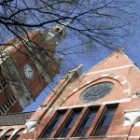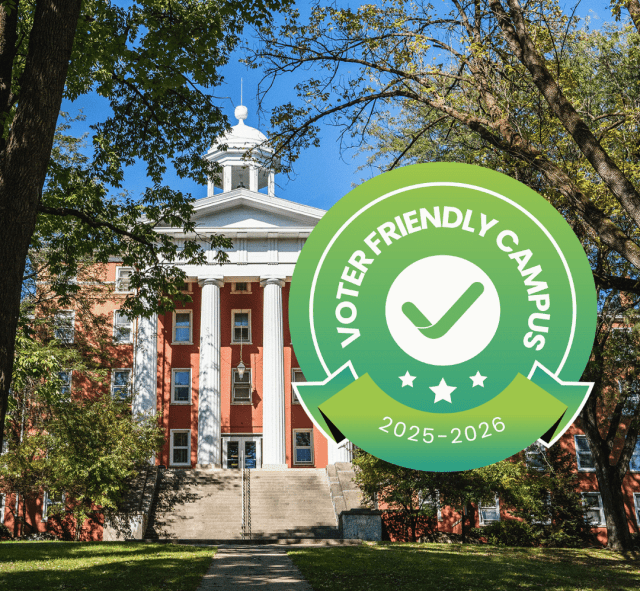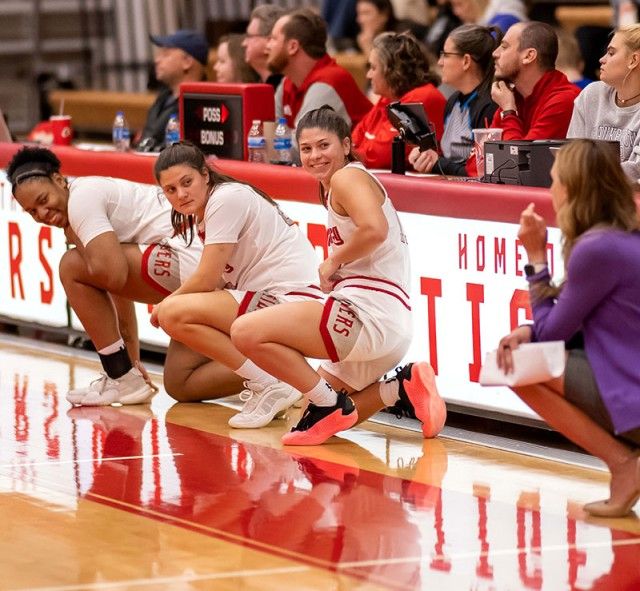Wittenberg students are gearing up to climb mountains, scuba dive and visit Elvis' birthplace as well as the requisite tropical destinations during Spring Break 2008. But far from lazing away the week in the sun, many of them are extending their local community service efforts to the global community.
Weeks after receiving a commendation on the President's Higher Education Community Service Honor Roll, more than 100 Wittenberg students will prove the university's dedication yet again by taking part in volunteer programs supported by the Community Service Office and organizations such as Habitat for Humanity, PrimeTime, Parliament of the Wittenberg Environmental Revolution (PoWER), Students Taking Action Now Dammit! (STAND) and Bridges to Community's volunteer program to the Central American nation of Nicaragua.
"I think I'm very privileged," said Nicole Butler, class of 2008 from Bellefontaine, Ohio. "It's incredible to help people...find out what they're struggling with and offer them a little bit of hope."
Butler is one of 54 students taking a bus to New Orleans to continue aid after the devastation left by Hurricane Katrina in 2005. PrimeTime, the Wittenberg chapter of the national organization Campus Crusade for Christ, is sponsoring the trip. The Office of Community Service will do similar work in the hurricane devastated region of Port Arthur, Texas, while Habitat for Humanity is deploying volunteers on three separate trips to South Carolina, Texas and Mississippi.
"We're gutting houses and rebuilding and working with homeless people," Butler said. "We're just doing anything to rebuild the city."
Upon arrival in New Orleans, the Wittenberg volunteers will work from 8 a.m. to 4 p.m. for four straight days on a donated boys' home by tearing out damaged walls. The group also plans to visit a homeless shelter and assist at a soup kitchen. In their off-time they will be making a visit to New Orleans' oldest and most famous neighborhood, Vieux Carre, also known as the French Quarter.
In Port Arthur, Texas, Wittenberg students have similar work projects where the effects of Hurricane Rita in 2005 persist. Americorps VISTA Service Leader working in the Office of Community Service Melissa Jackson is co-leading the trip.
"We decided to go someplace different," Jackson said. "The Lutheran Disaster Response said they needed help because they haven't gotten enough of it because they were overshadowed by Hurricane Katrina."
From 8 a.m. to 5 p.m. the Community Service students will be working on the interiors of several destroyed houses — putting up drywall, mudding and taping, in which they have already received training. The student volunteers will lodge at "Sheppard's Inn," an old nursing home now used to house up to 150 volunteers working on rebuilding.
The STAND volunteers will be housed at the less exotic local Travelodge Inn in Pensacola, Fla. However, they will be teaming up with the Florida Department of Environmental Protection (FDEP) to replant depleted sea grass in Pensacola's coral reefs. Kevin Swagler, class of 2010 from Monclova, Ohio, made preparations for the unique eco-friendly expedition.
"I wanted to do community service and wanted to do a spring break trip," said Swagler, a biology major. "I actually went on My Space. They had a list of things working with the Florida Department."
To attain a happy medium between fun and work, the 13 students on the STAND trip plan to take a snorkeling class on the Monday after they arrive. For the rest of the week the students will be assisting the FDEP in ways which best suit their fields of study. Business majors will help the FDEP crews with paper work, while biology majors will assist with such research as helping find the best soil suitable for the sea grass transplants.
"A lot of weeds have been taking over the sea grass," Swagler said. "It [the sea grass] gives birds and animals shelter and keeps sea foam down. It keeps down carbon dioxide and helps with oyster repopulation."
From under the ocean to a mountain top hundreds of miles away, another STAND-sponsored trip takes students to Southern Appalachia in Virginia from March 1-9. For a registration fee of $50 to $100 plus the price of gas, the volunteers will take part in the Mountain Justice Program, which works to minimize the detrimental effects of coal mining and mountain top removal.
"We will be in the community where they are experiencing mountain top removal," said Megan Hentges, class of 2010 and president of STAND. "This is the opportunity to learn exactly what mountain top removal is and to try to stop it."
The group will spend the period camping outdoors, taking part in workshops on Appalachian coal mining, music and culture featuring Appalachian activists as well as hiking, Appalachian mountain music, dancing and campfires.
Wittenberg students will also continue their international service efforts with a trip to Nicaragua to build homes for impoverished families for a sixth straight year. Eight to 10 members of the Wittenberg community will team up with students from Clark University in Guanacastillo to build three to four homes with local volunteers. After participating in the trip the last two years, Christopher Hewitt, class of 2008 from Louisville, Ohio, is a student leader on the 2008 trip.
The Wittenberg students will work on what will be some of the first houses in the newly established rural village of Guanacastillo. They will work from Monday to Friday, eating and sleeping among the locals. But the daily diet of rice and beans and waking up with the animals does not discourage Hewitt.
"This is benefiting people who live on nothing," said Hewitt. "Last year, we helped build a home for a mother, sister and her kids. The kids helped us put up bricks while the adults went to work."
The work hours last from 8 a.m. to 5 p.m. Hewitt and the volunteers spend their lunch breaks playing soccer with the children. On Friday and Saturday afternoon, they will take field trips within the area. In the past, Hewitt has visited textile factories, where many of the residents work, a volcano and a rainforest. At the end of the trip, Hewitt leaves with lasting bonds of friendship with the people he has worked with.
"One of the guys still calls me," Hewitt said. "He speaks broken English and I speak broken Spanish. So they're not very long conversations."







